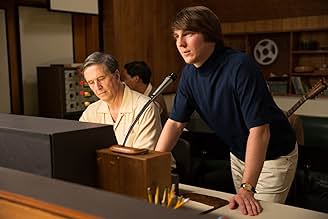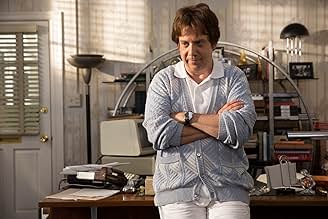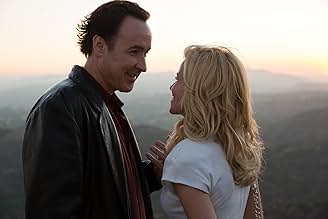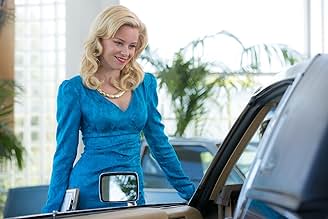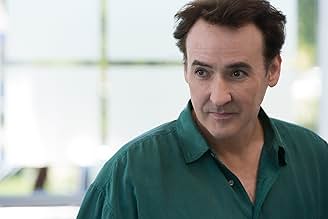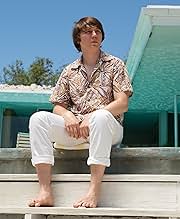In den 1960er-Jahren kämpft Brian Wilson, Gründer und Kopf der Beach Boys, mit seiner beginnenden Psychose, während er versucht, ein avantgardistisches Pop-Meisterwerk zu schaffen. In den 19... Alles lesenIn den 1960er-Jahren kämpft Brian Wilson, Gründer und Kopf der Beach Boys, mit seiner beginnenden Psychose, während er versucht, ein avantgardistisches Pop-Meisterwerk zu schaffen. In den 1980er-Jahren ist er ein gebrochener, verwirrter Mann, der 24 Stunden am Tag unter der Beoba... Alles lesenIn den 1960er-Jahren kämpft Brian Wilson, Gründer und Kopf der Beach Boys, mit seiner beginnenden Psychose, während er versucht, ein avantgardistisches Pop-Meisterwerk zu schaffen. In den 1980er-Jahren ist er ein gebrochener, verwirrter Mann, der 24 Stunden am Tag unter der Beobachtung des fragwürdigen Therapeuten Dr. Eugene Landy steht.
- Regie
- Drehbuch
- Hauptbesetzung
- Auszeichnungen
- 20 Gewinne & 58 Nominierungen insgesamt
Empfohlene Bewertungen
In an unusual artistic approach, Paul Dano plays Brian from the 1960's period that resulted in the revolutionary Pet Sounds album and the ongoing battle with his domineering father; while John Cusack plays Brian from the late 1980's - his most creatively bankrupt period and the subsequent debilitating influence of quackster psychologist Dr. Eugene Landy (Paul Giamatti).
The two periods are blended together as we (and Brian) bounce back and forth between the struggle of a budding musical genius working to release the sounds in his head, and a middle aged man so heavily medicated that speaking, eating and even getting out of bed are such overwhelming obstacles that music rarely registers. It's during the latter period that Brian is truly at the mercy of Dr. Eugene Landy. Giamatti sports a floppy wig and proceeds to rage at Brian while trying to charm Melinda (Elizabeth Banks), Brian's new romantic interest. Knowing this disgusting period was part of Brian's life only adds to the anger and frustration we feel not just as fans, but as human beings.
What sets this biopic apart is actually the performance of Dano and the peek inside the process of Brian's genius. Watching Brian work the musicians and mold the music on the fly is breath-taking, even though we see the challenges of his early mental issues. It's a joy to see a tribute to the studio session players known as "The Wrecking Crew" themselves the subject of a recent stellar documentary. It's during this period that the Wilson brothers' father (played by Bill Camp) constantly derides Brian and his "new" music. There is also some insight into the Brian vs Mike Love battles – Brian exploring his creative music, while Mike just wants to keep cashing in with their expected "fun" style.
Some may find the two-headed approach to be distracting, but it drives home the point of what a different man he was in comparing the mid-1960's to the late 1980's. Mostly, I found the 1960's portion to be an insight into what we hear from so many geniuses, regardless of their specialty. Brian says it's like "Someone is inside me. Not me." His struggles are non-relatable to others – even his brothers, and especially his dad. What is mostly a look at the darkness behind the "sunny" music, does come with real life redemption courtesy of Melinda's strength and witnessed in the video shown over the closing credits.
This is a compelling biopic of an interesting person. Paul Dano really hits it out of the park. His section has some great scenes. On its own, John Cusack does a great job. Put together, I can't help but think that Cusack is doing a passable imitation of Dano's performance. I'm not judging their relative acting skills. I just think that Dano has always played this type of character and he simply fits better. I'm certain that Dano would be nominated for an Oscar if he played both time periods. Landy is the villain of the piece and Giamatti plays him with gusto. For a more nuanced character, the movie needs to show his character saving Brian at the beginning. Splitting the time period so neatly does lessen some important sections of Brian's life.
We first encounter Brian (Paul Dano) during the 1960s, shortly before the band is scheduled to head out for a tour of Japan. Reluctant to return to the road, Brian convinces his brothers that he belongs at home in the studio, where he'll be more effective at creating the band's next album. The boys finally acquiesce, and Brian hires a collection of studio musicians to begin crafting what would ultimately become Pet Sounds.
Our next encounter with Brian comes during the 1980s, where he's portrayed by John Cusack. Brian meets, and attempts to court, Cadillac saleswoman Melinda Ledbetter (Elizabeth Banks), but she quickly discovers that Brian's life is not his own when she meets Dr. Eugene Landy (Paul Giamatti), his therapist and legal guardian. Landy controls every aspect of Brian's existence, from his diet to his personal relationships, all the while insisting that he has Brian's best interests at heart.
The film frequently cuts between these two periods in Brian's life. We see the depths of his imagination and creativity as he employs a range of nontraditional elements to record Pet Sounds, desperately trying to bring to life the music he hears in his head, and all the while sliding further and further into the grip of severe mental illness. And we see the results of that illness, as Brian becomes a timid, broken man, cut off from his friends and family, allowing himself to be controlled and manipulated, and never able to find peace.
Director Bill Pohlad does a marvelous job of illustrating the parallels between each on screen version of Brian Wilson, and both actors give brilliant, emotional performances. Dano in particular turns in what can arguably be called the best work of his career, perfectly embodying Brian's childlike glee as he excitedly flits around the studio, and capturing the anguish and desperation as his mind continues to deteriorate.
Unorthodox in its approach and admirable in its complexity, Love & Mercy wisely chooses not to paint a definitive portrait of a man whose life couldn't possibly be summed up in a two-hour film. By confining the narrative to these two specific chapters, we're able to go far beyond the surface and reveal the inner workings of a tortured genius, and shed light on a story that few people are familiar with. Love & Mercy is a truly exceptional film about the internal and external struggles of a truly exceptional person, and is one of the most emotionally resonant experiences I've had with a film this year.
I found out that a biopic of Wilson was in the works, and would be screening at SXSW with Wilson in attendance. I knew I had to go and see this film. The experience is one that will stick with me for the rest of my life as one of the most emotionally powerful events I have been a part of.
Love and Mercy is the story of The Beach Boys' founder Brian Wilson. The film chronicles his rise to fame in the 1960's and the his decline into mental illness, and his escape from the control of his therapist in the 1980's.
Paul Dano plays Wilson in the 1960's, and John Cusack plays him in the 1980's. It also stars Elizabeth Banks as Wilson's future wife, Melinda Ledbetter, and Paul Giamatti as his therapist, Eugene Landy.
Paul Dano exudes the boyish look of young Wilson perfectly. He relearned how to play piano for the role, and sings much of the music in the film.
His performance is hard to watch at times because of how depressing it is seeing him devolve from an energetic, fun young man into a tortured, drained artist. Dano handles the role with passion and care, and his performance never feels forced or fake.
When Wilson begins to suffer a panic attack, anyone who's had one will feel deeply for him. When he starts to have physical symptoms of depression after years of physical and mental abuse from his father and disapproval of his musical direction from fellow band mate Mike Love, Dano portrays the hurt that comes from those events with subtle facial expressions and natural transition.
John Cusack looks less like Wilson physically, but his performance may be even more complex. His Wilson has been to the bottom, and he brilliantly portrays how challenging it is to rebuild your life after going through mental and physical anguish.
Elizabeth Banks has a great departure from her more well known comedic film roles, and as Ledbetter, she shows her strength and respect for the man she loves through actions and subtle expressions instead of overt, over the top dialog.
Paul Giamatti has the most campy role in the film as Eugene Landy, but this is unfortunately how Landy was in real life. He was as violent and controlling over Wilson's life as the movie portrays, so his abusive, manipulative, angering performance is highly accurate.
One of the best things about Love and Mercy is that it doesn't exaggerate or make up events to make the film more interesting. The filmmakers trust the strength of its source material is interesting enough to make for a great story.
The storytelling structure of the movie is interesting and risky. The film jumps from the 60's to the 80's without warning, and it works. The slightly askew technique allows the audience to experience the downfall and uprising of Wilson's life simultaneously, and allows the movie to end on a happy note.
One complaint people have is that the film skips over the 1970's, Wilson's most tumultuous period in which he weighed 300 pounds and spent the majority of three years in bed, crippled by depression and drug addiction. However, this allows the audience to examine the reasons for his downfall and redemption instead of indulging in the horrible escapism Wilson turned to.
Beach Boys fans will appreciate the movie more than the average film-goer. Mike Love in hats, dancing, and mentioning "the formula"? Check. Drug tent and piano in the sandbox in Wilson's living room? Check. The infamous "Fire" session? Check. Everything is on point, from the scarily accurate wardrobe down to recreating the "Sloop John B." and "Surf's Up" promo videos shot for shot. It's these moments that show the film was made by fans with an attention for detail.
Almost every song on the album Pet Sounds is featured in the film somewhere. Seeing Wilson's unorthodox recording techniques is such a pleasure for music nerds.
Cinematographer Robert Yeoman, best known for creating the look of Wes Anderson's films, blends stylistic tone with realistic camera work, creating a sense of false nostalgia that is surreal yet inviting and intense.
Composer Atticus Ross works wonders with the score, using a great wealth of Wilson's music in different ways and choosing songs that fit with the emotional tone of the scene brilliantly. Hearing the instrumental version of "Don't Talk" play as Wilson takes LSD for the first time is haunting. Witnessing the song "Til' I Die" play over a surreal, Kubrickian scene in which Wilson has an epiphany made me cry because of the powerful combination of imagery and music.
The film is being released on June 5, to capitalize on The Beach Boys music being a staple of the summer, but it feels more like a Thanksgiving release to me. The cinematography, acting, script, and score are all Oscar worthy in my opinion, but the film may get lost in the race to other contenders, which is a shame.
Love and Mercy is an awesome, unorthodox biopic that takes risks with form and narrative that has strong performances, script, cinematography, and of course, an amazing soundtrack. It will expose young people to the brilliance of Wilson's music and give older fans an insight into why Wilson is the poster boy for using creativity as an escape and an outlet from the pain of life and mental illness.
And seriously, listen to the album SMiLE.
Wusstest du schon
- WissenswertesThe real Wilson reported having a mild dissociative experience while watching the film. He started to believe that Paul Giamatti was the actual Eugene Landy and felt "absolutely in fear" for several minutes.
- PatzerContrary to what is shown, the recording for "Good Vibrations" began during the making of "Pet Sounds", not after.
- Zitate
Brian Future: I want you to leave, but I don't want you to leave me.
- Crazy CreditsFirst, there's concert footage of the recent Brian Wilson, himself, singing "Love & Mercy", and then at the very end there is audio of a brief recreated studio recording of Good Vibrations, with '60s Brian leading the dialogue.
- Alternative VersionenThe version which premiered at the 2014 Toronto Film Festival and a few subsequent public screenings contained a few extra scenes, such as an "I Get Around" studio sequence, and a scene where Wilson meets Phil Spector on the street. The closing song "One Kind of Love" was also absent from this cut.
- SoundtracksSurfin' U.S.A.
Written by Chuck Berry
Lyrics by Brian Wilson (uncredited)
Performed by The Beach Boys
Courtesy of Capitol Records
Under license from Universal Music Enterprises
Top-Auswahl
- How long is Love & Mercy?Powered by Alexa
Details
- Erscheinungsdatum
- Herkunftsland
- Offizielle Standorte
- Sprache
- Auch bekannt als
- Amor y Compasión
- Drehorte
- Produktionsfirmen
- Weitere beteiligte Unternehmen bei IMDbPro anzeigen
Box Office
- Budget
- 10.000.000 $ (geschätzt)
- Bruttoertrag in den USA und Kanada
- 12.551.031 $
- Eröffnungswochenende in den USA und in Kanada
- 2.122.177 $
- 7. Juni 2015
- Weltweiter Bruttoertrag
- 28.641.776 $
- Laufzeit2 Stunden 1 Minute
- Farbe
- Sound-Mix
- Seitenverhältnis
- 1.85 : 1
Zu dieser Seite beitragen








